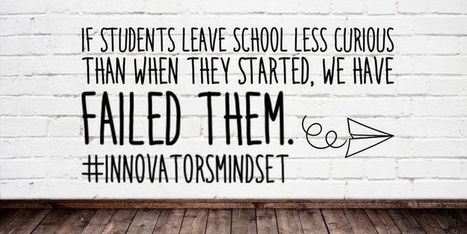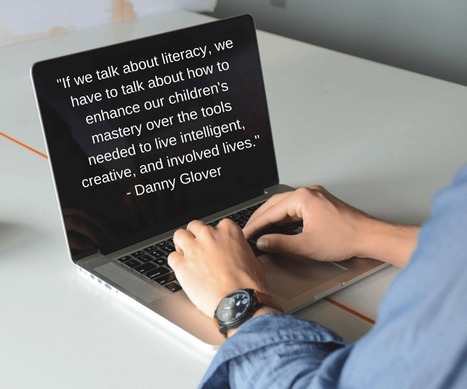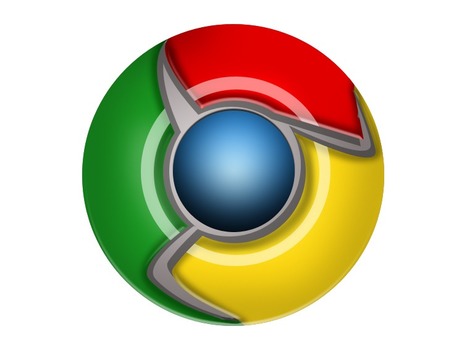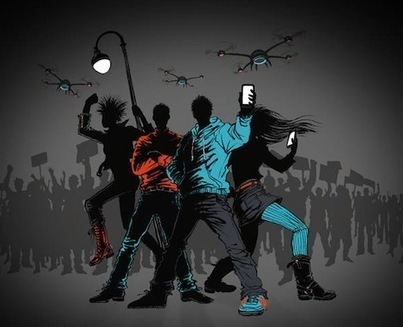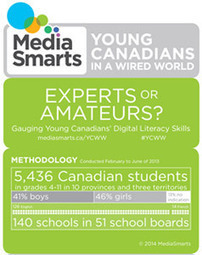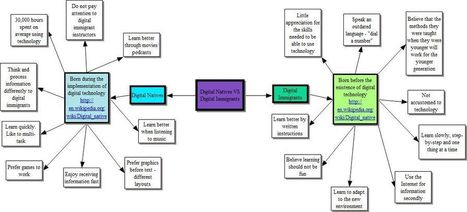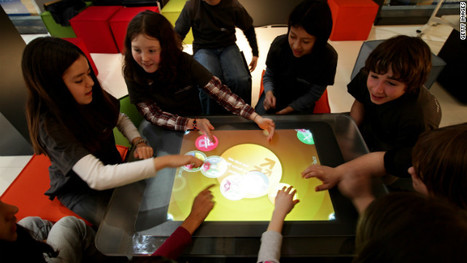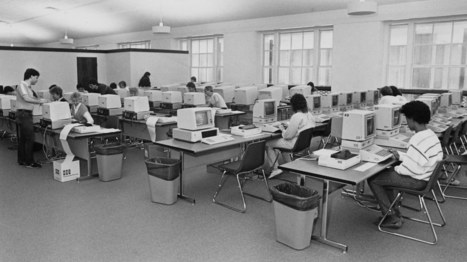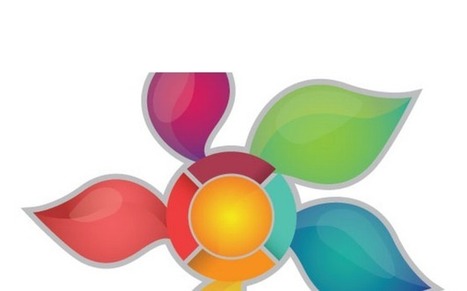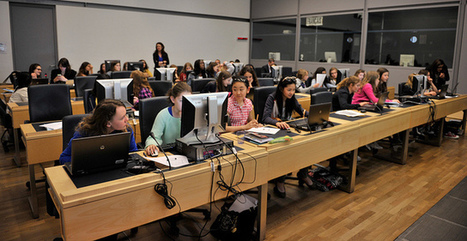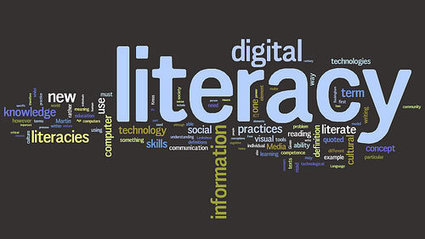 Your new post is loading...
 Your new post is loading...
"The term “digital immigrants” and “digital natives” is almost as annoying as the fights are about the terminology. These terms are often credited to Marc Prensky, and from when I have had the opportunity to have heard him speak, he doesn’t believe that kids have an innate ability to use technology over adults. They have not known a world with anything different."
Via EDTECH@UTRGV
Textbook makers, bookstore owners and college student surveys all find a preference for old-fashioned print.
In one of my older posts “Are Digital Natives Digitally Literate?“, I questioned the assumption that all “digital natives” are by definition tech savvy. As I reflected on the term, as well as my experience in teaching digital natives, I came to a conclusion that it is not about being a “digital native” at all (i.e., being born past a certain year and having exposure to a device from birth). Just as it is with being a native speaker of a language, being simply born into a society and having exposure to the language does not mean one won’t have to learn how to be literate in that language. Finally, my conclusion that the key is not being “native” but being “literate” pushed me to think further and search for types of literacies we (both natives and immigrants) have to develop to successfully function in the digital era.
My goal, however, was not to simply challenge this status quo. Rather, it was to identify the assumptions that create a “blind spot” which, in turn, puts us all in danger of missing the key point: a device in a student’s hand does not mean he or she knows how to use it most effectively to achieve academic or professional goals.
Via Miloš Bajčetić
Understanding digital behaviour can help us improve the way we deliver and facilitate access to information.
Teaching Google Natives To Value Information The usual term is a digital native–students born into our digital, connected, and uber-social world who have always had Wikipedia to ask questions, and Google to bail them out.
Breaking education news about schools and further education. Find leading opinion, podcasts, comment and analysis on education from TES News
Cory Doctorow discusses the importance of Internet privacy, and how companies profit from our mistakes.
Professors at Northwestern University are training students to build online identities that can advance their academic and professional careers.
This report is drawn from a national survey of Canadian youth conducted by MediaSmarts in 2013. The classroom-based survey of 5,436 students in grades 4 through 11, in every province and territory, examined the role of networked technologies in young people’s lives. Experts or Amateurs? Gauging Young Canadians’ Digital Literacy Skills (the fourth in a series of reports from the survey) explores the level of young people’s digital literacy skills, how they are learning these skills and how well digital technologies are being used in classrooms to support these skills.
In yesterday’s Inside Higher Ed’s technology blog, Joshua Kim wrote about “Courses, Facebook, and Secret Groups,” in which he pointed out that “There is a world of social learning going on, and we (meaning us instructors, educational technologists – basically anyone employed on the instructional or administrative sides of the house), know nothing about what is going on.” He then explains how students are using Secret Groups in Facebook—as well as other technologies—to learn outside the classroom.
The war between natives and immigrants is ending. The natives have won.
Via Nik Peachey
The notion of digital literacy (and its close relation, the digital divide) is really starting to make waves, particularly with the recent stateside launch of the Everyone On campaign and the Go On...
|
For some time the debate on digital technologies has been present in the educational environment. However, the true challenge is not whether to use technology or not, but to rethink education with it. Today’s technologies define a new learning environment that modifies our relationship with contents, requires new forms of teaching-learning, and blurs the boundaries between classroom and home, formal and informal education. In this sense, it it not only a case of developing a set of skills and abilities of a technical nature, but a combination of behaviours, specialised and technical knowledge, working habits, arrangements and critical thinking. Talking today about digital education is, therefore, something more than just talking about training in digital literacy.
In these four provocations, anthropologist Donna Lanclos argues that the notion of the "digital native" is bogus and disempowering, that pandering to student expectations can backfire, universities should be open by default, and our attitude to educational technology needs a rethink.
As with many ideas which may be simply stated Prensky’s world of ‘Digital Natives and Immigrants’ has been oversimplified and misunderstood. In part this is the danger that comes with relying upon a cultural metaphor and a consequence of society’s love affair with neat dichotomies.
Via Nik Peachey
Today's schools are focusing on boosting kids’ technological proficiency and warning them about the perils of the web. But something critical is missing from this education.
Perhaps you saw the recent story in the New York Times about the new research on middle-school students’ digital literacy skills? This research shows that although kids can use digital and social media for entertainment, they can’t access information, comprehend it, or evaluate it to create their own interpretation.
Digital literacy is an essential skill for young adults when it comes to browsing the Web. Understanding the context, the authoritativeness of the work, and its credibility can help with educational, professional, and personal development.
Is it possible for our students to be both digital natives and digitally unaware? Young people today are instant messengers, gamers, photo sharers and supreme multitaskers. But while they use the technology tools available to them 24/7, they are struggling to sort fact from fiction, think critically, decipher cultural inferences, detect commercial intent and analyze …
Digital Journal is a digital media news network with thousands of Digital Journalists in 200 countries around the world. Join us Canadian youth are not as digitally literate as adults may think they are, according to new research released today by MediaSmarts. Though today's young people have grown up immersed in digital media, they still rely on parents and teachers to help them advance their skills in areas such as searching and verifying online information. MediaSmarts, a Canadian not-for-profit organization, surveyed over 5,400 students in classrooms across the country on their Internet behaviours and attitudes for its Young Canadians in a Wired World study.
Read more: http://www.digitaljournal.com/pr/1822162#ixzz2yltlXUk6!
Teaching Google Natives To Value Information The usual term is a digital native–students born into our digital, connected, and uber-social world who have always had Wikipedia to ask questions, and Google to bail them out. There is nuance to this phenomenon that can distract a bit from the big picture. As with so many complex issues, it is tempting to over-generalize things—claims that 21st century students need to be taught with 21st century tools, or raging against the machine and forcing students to use books, dammit.
The Journal of Online Learning and Teaching Prensky's piece and where we are now.
A study found that South Korea leads the world in its percentage of youth who have used the Internet for at least five years. At the bottom of the list is the Pacific island of Timor-Leste.
It’s almost back to school–a good time to clear out the cobwebs and challenge some conventional wisdom. Hype is seductive, and an enemy of clear thought. Luckily, I’ve recently come across some very well-spoken and thoughtful criticism of long-cherished ideas–even some of my own! Consider it a blast of compressed air for your brain instead of your keyboard. This is the first of two posts. The second will appear Thursday.
|



 Your new post is loading...
Your new post is loading...

